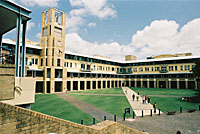|
||||||||||||||||||||||||||||||||||||||
| Therapeutics and the Molecular Basis of Disease 1 - PHPH9107 | ||||||||||||||||||||||||||||||||||||||

Description This course provides a basis for understanding the mechanisms involved in the disordering physiology that underlies common disease states. The object is to provide an understanding of those disorders that are amenable to correction or amelioration with drug therapy. It thus provides a rationale for drug design and utilization. The subject consists of five main sections. Section 1 is a review of relevant features of general biology with emphasis on (a) modern systems of taxonomy (natural products are still a major source of lead compounds for developing new therapeutic agents) and (b) biochemistry with emphasis on those aspects relevant to molecular biology and biochemical pharmacology (the other two main areas involved in new drug development). Section 2 deals with cellular injury and death and covers causes of cell injury, general mechanism of cell injury an necrosis, apoptosis, stress proteins and cell injury, subcellular alterations in cell injury, intracellular accumulations, pathologic calcification, hyaline change cellular aging. Section 3 covers cellular growth and differentiation including control of cell growth, extracellular matrix and cell-matrix interactions, and cellular adaptions of growth and differentiation. Section 4 deals with inflamation and repair and covers acute inflammation, chemical mediators of inflammation, chronic inflammation, morphologic pattern in acute and chronic inflammation, systemic effects of inflammation, wound healing. Section 5 covers oedema, hyperaemia and congestion, haemorrhage, haemostasis and thrombosis, embolism and shock.
Note: The course is elective for programmes 5504, and 9060. |
||||||||||||||||||||||||||||||||||||||


